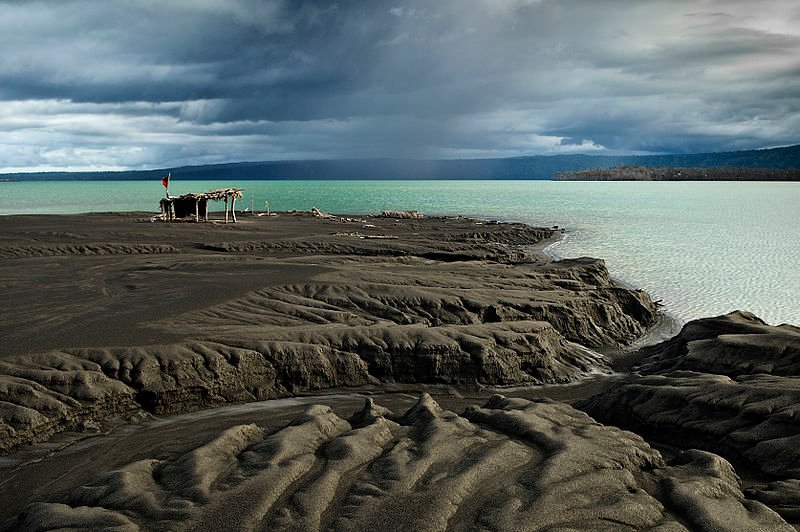 A shack on volcanic Mount Tarvurvur, Rabaul, Papua New Guinea
A shack on volcanic Mount Tarvurvur, Rabaul, Papua New GuineaSource: https://commons.wikimedia.org/wiki/File:Shack_at_Mount_Tarvurvur.jpg
Author: Taro Taylor

Papua New Guinea is a country occupying the eastern half of the island of New Guinea, along with offshore islands surrounding its coastline. Covering 462,840 sq km (178,703 sq mi), it is the second largest country in Oceania after Australia. Papua New Guinea has a land border shared with the provinces of Papua and West Papua in Indonesia. Its coastline faces the Bismarck Sea to the north, the Solomon Sea to the east, the Coral Sea to the southeast, and the Gulf of Papua to the south. Papua New Guinea has a population of 6.7 million people. Its capital and biggest city is Port Moresby.
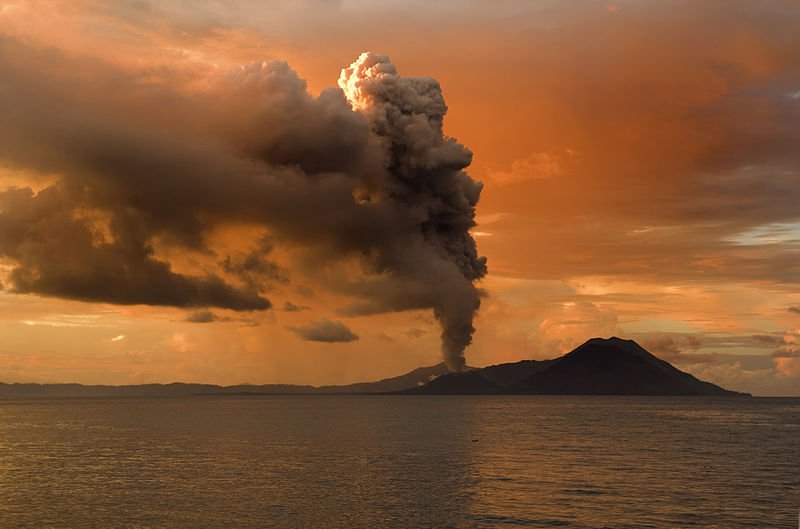 Tavurvur volcano, Papua New Guinea
Tavurvur volcano, Papua New GuineaSource: https://commons.wikimedia.org/wiki/File:Tavurvur_volcano_edit.jpg
Author: Taro Taylor

Papua New Guinea is in the Australian Eastern Standard Time Zone, which is 10 hours ahead of Coordinated Universal Time (UTC+10). Traffic here is driven on the left, the same as in Australia and Indonesia. The official currency is the Papua New Guinean kina (PGK). The phone IDD code is +675.
In 2009, Papua New Guinea had a nominal GDP of $7.9 billion, equivalent to a per capita nominal GDP of $1,247. Its per capita GDP at purchasing power parity stood at $2,166. This makes it poorer than its neighbor Australia, and even Indonesia's per capita GDP is twice its own.
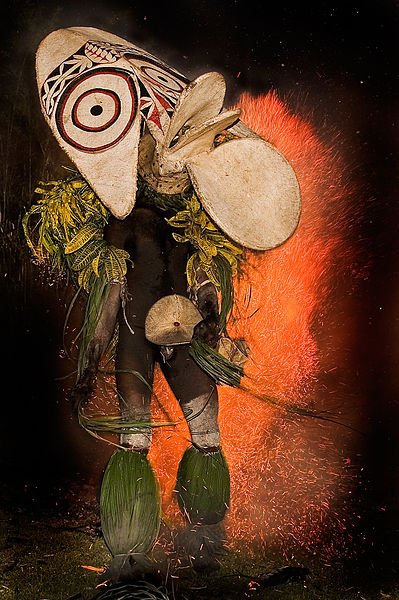 Baining Fire Dance of Baining, New Britain, Papua New Guinea
Baining Fire Dance of Baining, New Britain, Papua New GuineaSource: https://commons.wikimedia.org/wiki/File:Bainings_Fire_Dance.jpg
Author: Taro Taylor

Although Papua New Guinea has a population of just about 7 million people, it has over 850 indigenous languages. This makes it one of the most culturally diverse countries in the world. Even today, only 18% of its population live in urban areas, with the majority of its population scattered in the tribal heartland.
Apart from English, Tok Pisin is another official language. It is a creole form of English that is understood by most of the people in the country. Another official language is Hiri Motu, which unlike Tok Pisin, is not a pidgin or creole language.
Papua New Guinea has been an untamed land until 1884, when the northern half was administered by the Germans as German New Guinea. The name Papua is said to have been derived from a Malay word, pepuah, describing the frizzly hair of the local people. New Guinea was a name given by Spanish explorer Yñigo Ortiz de Retez in 1545, as the natives seemed to resemble those of the Guinea coast in Africa.
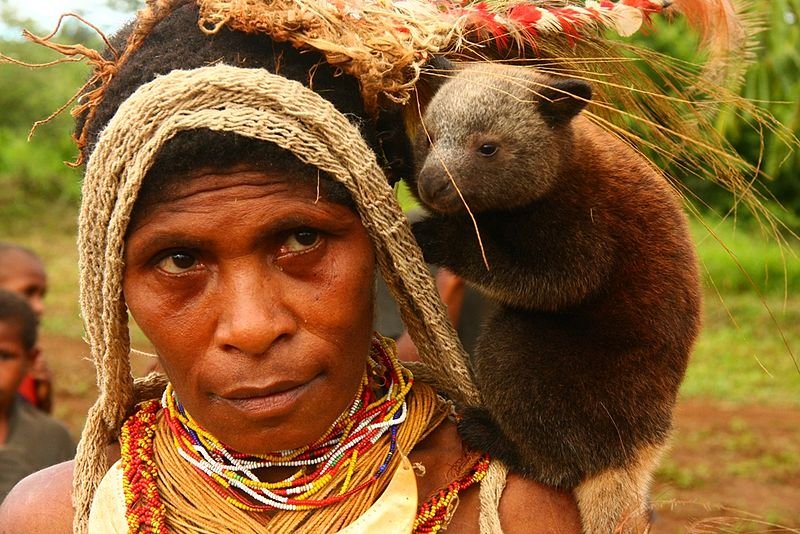 Chief's wife with tree kangaroo, Papua New Guinea
Chief's wife with tree kangaroo, Papua New GuineaSource: https://commons.wikimedia.org/wiki/File:Baby_tree_kangaroo_on_the_chiefs_wifes_shoulder_-Papua_New_Guinea-17Oct2008.jpg
Author: panvorax

Papua New Guinea was administered by Australia from the First World War until the country attained self-governing on 1 December, 1973, and independence from 16 September, 1975. Today is a federal constitutional monarchy with Queen Elizabeth II as Head of State, and the Governor-General of Papua New Guinea as the queen's representative. Executive powers lies with the Prime Minister. The country is a member of the Commonwealth of Nations.
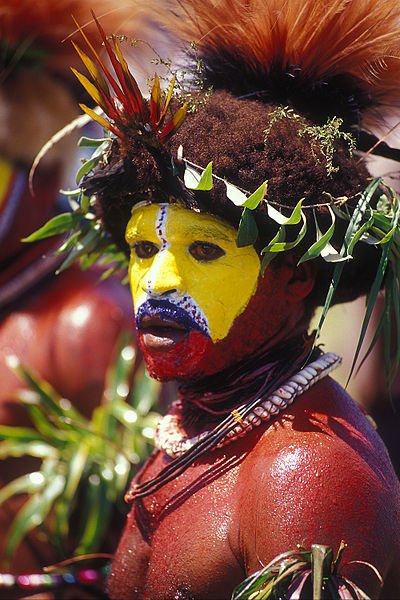 Huli Wigman of the Southern Highlands of Papua New Guinea
Huli Wigman of the Southern Highlands of Papua New GuineaSource: https://commons.wikimedia.org/wiki/File:Huli_wigman.jpg
Author: Nomadtales

Planning your visit to Papua New Guinea
Visitors from most countries including Australia, Canada, the United Kingdom, the United States and the European Union require a visa to enter Papua New Guinea. You also need a passport with a 12-month validity to obtain the visa.Jacksons International Airport (POM) in Port Moresby is the main international airport for Papua New Guinea. It receives flights from Brisbane, Cairns, Hong Kong, Kuala Lumpur, Manila, Singapore and Tokyo, among others.
Preparing Money for your trip to Papua New Guinea
The currency used in Papua New Guinea is the Papua New Guinean Kina (PGK).Major Cities in Papua New Guinea
- Port Moresby - capital
- Alotau
- Goroka
- Lae
- Madang
- Mount Hagen
- Rabaul
- Vanimo
- Wewak
Regions of Papua New Guinea
- National Capital District
- Bougainville
- Central
- Highlands
- Huon Gulf
- Madang
- Manus
- Milne Bay
- New Britain
- New Ireland
- Oro Province
- Sepik
- Simbu
- Western Province
Places of Interest in Papua New Guinea
- Kokoda Track
- Louisiade Archipelago
- Trobriand Islands
 Latest updates on Penang Travel Tips
Latest updates on Penang Travel Tips

Copyright © 2003-2025 Timothy Tye. All Rights Reserved.

 Go Back
Go Back